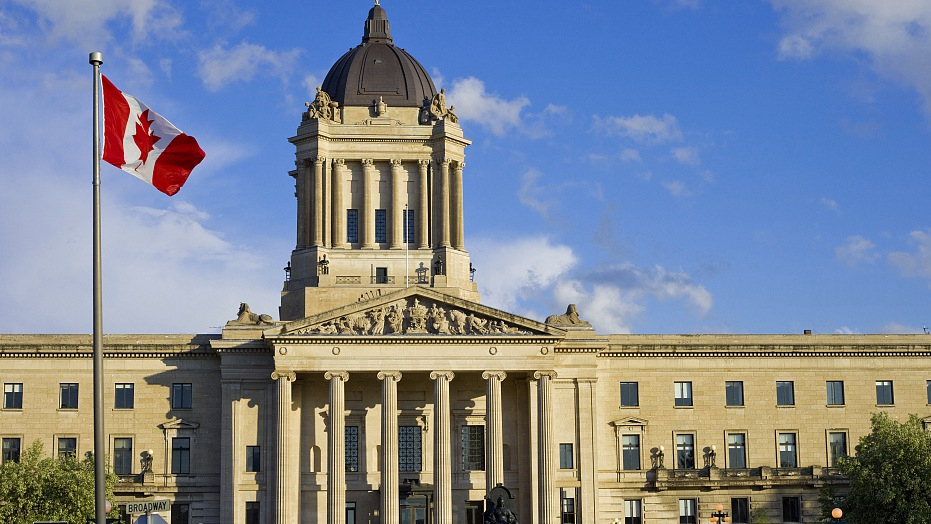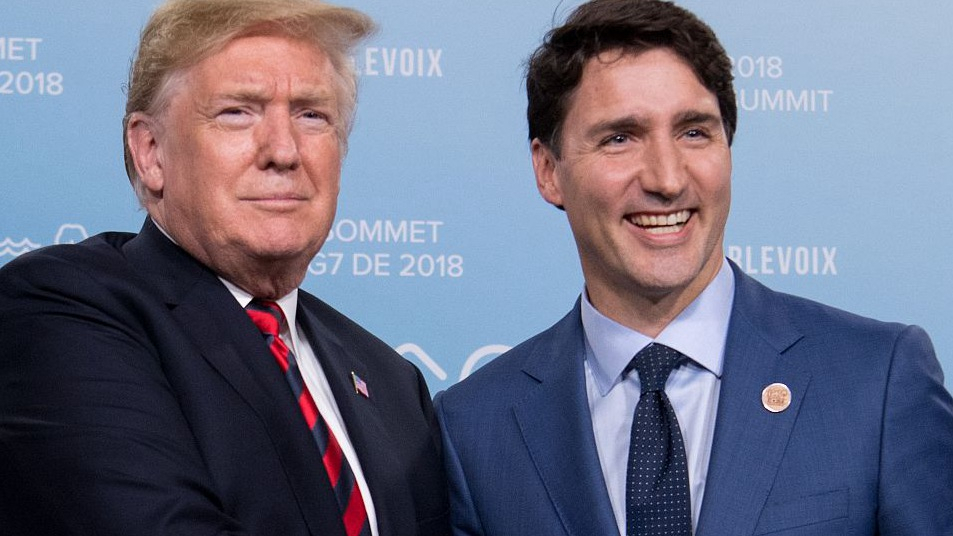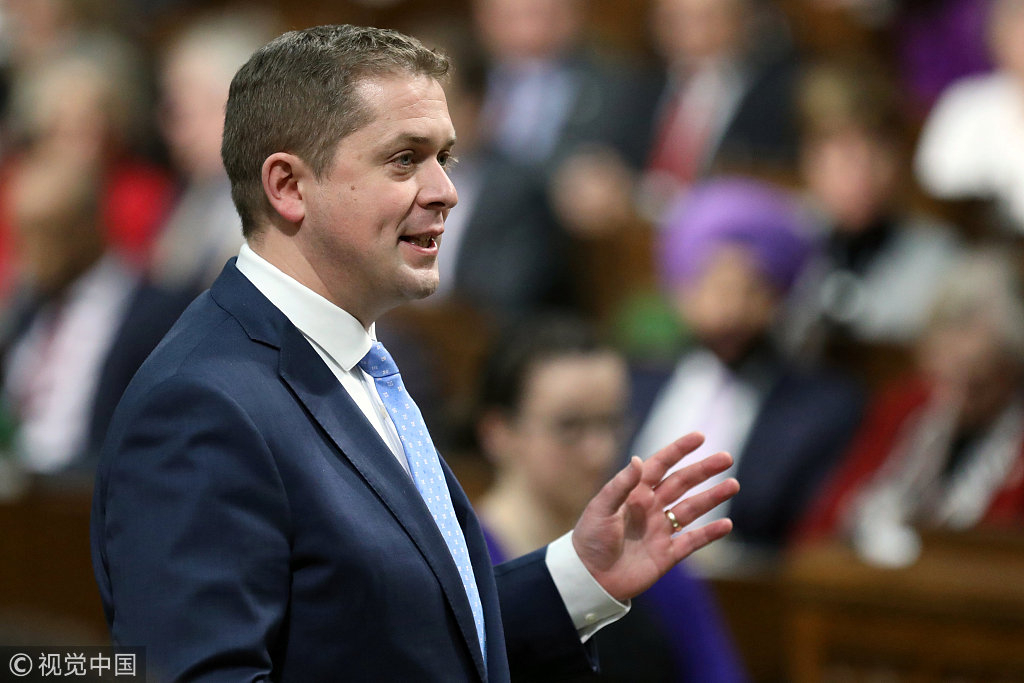
Opinion
13:17, 12-May-2019
Why a Scheer government might not plunge the China-Canada relationship further
Ken Moak

Editor's Note: Ken Moak, who taught economic theory, public policy and globalization at the university level for 33 years, co-authored a book titled "China's Economic Rise and Its Global Impact" in 2015. The article reflects the author's opinion, and not necessarily the views of CGTN.
During his election campaign, Andrew Scheer, leader of the Conservative Party of Canada and leader of Her Majesty's Loyal Opposition, outlined his foreign policy in a speech to the Montreal Council on Foreign Relations (MCFR) on May 7. The speech might shed light on the China-Canada relationship under Scheer's Conservative government.
According to Canadian polls, Scheer has more than a 50-percent chance of being elected prime minister in this fall's general election, according to Ipsos poll.
Should he win, Scheer vowed to "total reset" Canada's relationship with China, building a strong economic relationship and treating the Asian giant as a "strategic competitor."
That is, Scheer recognized the importance of the Chinese market to Canada's economy. But at the same time, he viewed China as Canada's "biggest threat."
It might be his anti-communist sentiments that drove Scheer to strengthen U.S.-Canada relations, join the U.S.-led missile defense coalition, bar Huawei from Canada's 5G rollout, and end a funding agreement with the Asian Infrastructure Investment Bank.

U.S. President Donald Trump (L) and Canadian Prime Minister Justin Trudeau hold a meeting on the sidelines of the G7 summit, La Malbaie, Quebec, Canada, June 8, 2018. /VCG Photo
U.S. President Donald Trump (L) and Canadian Prime Minister Justin Trudeau hold a meeting on the sidelines of the G7 summit, La Malbaie, Quebec, Canada, June 8, 2018. /VCG Photo
Sheer's China policy is a replay of an old movie
Earlier, former Canadian prime minister Stephen Harper vowed not to sell Canadian values to the "almighty dollar" on the China-Canada relationship. But nearing the end of his mandate, Harper discovered that policy stance was unfeasible, forcing him to make a "U-turn" in 2014.
He visited China in 2014 and came home with trade deals worth over two billion Canadian dollars, according to the Toronto Globe and Mail. He might have also discovered that China is not what the anti-China crowd claims. On his return, he vowed to "reset" the China-Canada relationship to "new heights."
Economics and politics would dictate that Scheer, despite harsh rhetoric, might put the China-Canada relationship on track because Canadian economic conditions are even direr today than those of Harper's time.
U.S. President Donald Trump's imposition of tariffs on Canadian steel and aluminum and the trade fight against China are taking a toll on the Canadian economy.
Moreover, finding an alternative market the size of China's might be easier said than done. The EU and Japan are in even worse economic shape than Canada, with the World Bank estimating that the two Canadian "friends and allies" would grow at less than two percent in 2019 and 2020.
India's relatively small economy, estimated at 2.6 trillion U.S. dollars, is in no position to buy huge quantities of Canadian resources. Australia is more of an "economic competitor" than "partner" because it is selling almost identical products: coal, agricultural and other resources.
Further, Scheer is from Saskatchewan, whose economy largely depends on exporting potash, canola and other agricultural products. China is a major, if not the biggest, buyer of the province's products. In this sense, being "tough" on China might end up with Sheer "shooting himself in the foot."

Conservative leader Andrew Scheer speaks during Question Period in the interim House of Commons in the West Block on Parliament Hill in Ottawa, Ontario, Canada, February 25, 2019. /VCG Photo
Conservative leader Andrew Scheer speaks during Question Period in the interim House of Commons in the West Block on Parliament Hill in Ottawa, Ontario, Canada, February 25, 2019. /VCG Photo
Policies based on questionable assumptions are not sustainable
A recent Canadian parliamentary committee, made up of lawmakers from all political parties, reported that China is the country's "biggest threat." However, the assumptions and information that led to the committee's commission are questionable.
Accusing Chinese nationals of being spies for the government is pure speculative nonsense. There is no history of Chinese students, immigrants or others having ever been convicted of spying for the Chinese government. In this sense, the spying accusation is fearmongering.
Barring Chinese students, tourists and business people from entering Canada on that fear would be the country's loss. Chinese students constitute the largest percentage of foreign students in Canada, bringing billions of Canadian dollars to its universities.
Restricting Chinese state-owned enterprise investment in Canada for no reason other than a "perceived" threat could undermine economic growth.
The York University law professor Gus Van Harten wrote an open letter (published in the October 12, 2012 Tyee Newsletter) to Stephen Harper, warning the prime minister of a bilateral investment treaty (BIT) with China could risk billions of Canadian taxpayers' money.
Though Van Harten did not explain why that might be the case, Harper did cancel the signing of the BIT. Since then foreign and domestic investment in Canada's oil sands literally halted, perhaps a reason for Alberta's, and by extension, Canada's economic woes.
Taking the argument to its logical conclusion, Scheer would not and should not plunge the China-Canada relationship lower than what it is today because China could pull the Canadian economy out of slow growth.
Besides, China has never threatened any country until the U.S. and Canadian anti-China crowds said it did. Further, policies based on flawed assumptions and questionable facts could end up hurting the Canadian economy as demonstrated by Harper's era.
(If you want to contribute and have specific expertise, please contact us at opinions@cgtn.com.)

SITEMAP
Copyright © 2018 CGTN. Beijing ICP prepared NO.16065310-3
Copyright © 2018 CGTN. Beijing ICP prepared NO.16065310-3